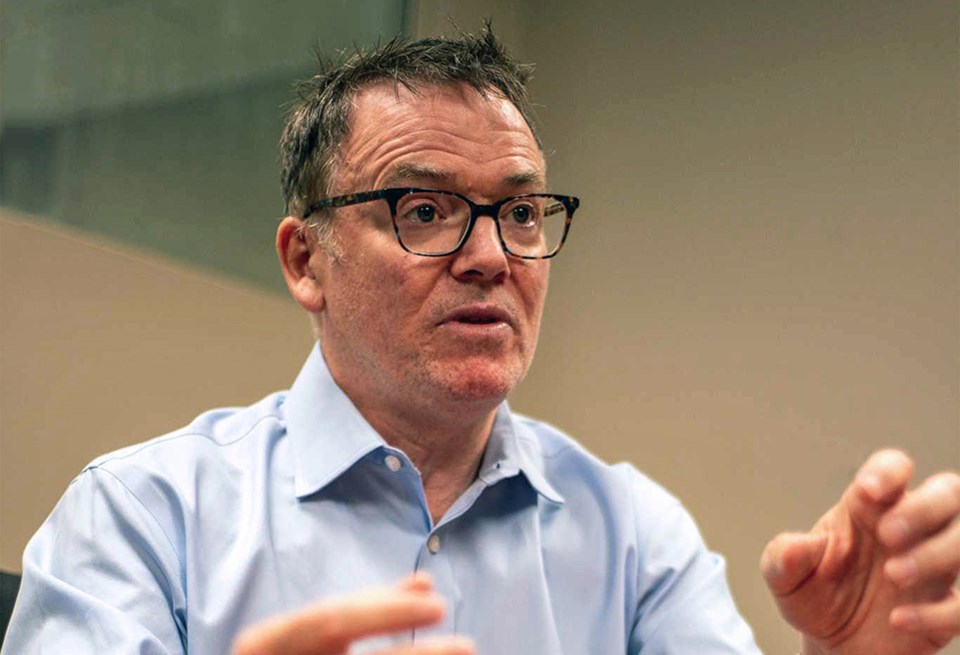BC United may still be reeling from defections and declining donations, but the party succeeded in doing something rare in politics on Tuesday: Making a promise so big it could cut through the veil of disinterested fog that surrounds most of the general public.
A $5.4-billion tax cut for 2.4 million people does tend to do that. So does messaging that says things like “the plan would result in the complete elimination of provincial income tax for 60 percent of people, while putting an extra $2,050 per year back into the pockets of British Columbians.”
“A senior living on a fixed pension of $40,000 and struggling to adjust to skyrocketing costs under the NDP will pay zero in provincial income tax,” said BC United Leader Kevin Falcon.
“BC United’s tax cut policy would be reflected in more powerful pay cheques for folks across the province. You’ll keep more of the money you earn.”
As policy proposals go, raising the personal income tax exemption from $11,980 to $50,000 was one of the most ambitious ideas pitched by any B.C. political party in recent history.
To supporters, it was a bold and innovative move that will benefit low-income workers, those earning minimum wage and seniors. To critics, it was a desperate Hail Mary with no details on costing, which raises fears it will be achieved by cutbacks to other government services.
Amidst an ongoing affordability crisis, however, United’s pitch could have surprising staying power.
The public, still hammered by the cumulative effect of interest rates, grocery prices, inflation and other pressures, has shown it doesn’t much care whether the BC NDP runs record-setting deficits, doubles the provincial debt, or overspends on new hospitals and schools, as long as it helps people afford day-to-day life a little bit easier.
In that, then, there is perhaps grace for United to propose a massive tax cut, even without an explanation of how to pay for it.
“No, services do not have to be cut,” said Falcon, when asked.
“This is one of the great myths of the left. The NDP will tell you that all their spending is actually really important, good spending. Well, I would argue they’ve got it wrong. Use health care as an example. They spend more on health care than we’ve ever spent. But the problem is, we’re getting the worst outcomes we’ve ever seen in health care.
“I do not measure success by how much we’re spending. I measure it by the outcomes we’re getting.”
It is true that the BC NDP has fallen into the time-honoured trap of tired governments who substitute a lecture about budget increases for showing actual progress on solving the public’s problems.
But it is also true that a $5.4-billion tax cut by any party, without an explanation of how the revenue would be recovered, has an undercurrent of desperation. The risk is compounded for United, which has also promised to balance the budget within its first four years.
The official BC United explanation is that the income tax cut would spur consumer spending, which could spur economic activity, which would spur job growth, which would then supercharge the economy and bring back untold revenue into the treasury through other tax sources.
The vagueness left an opening for attack by Premier David Eby.
“What Mr. Falcon has proposed is quite an extreme and radical proposal that would require cuts to the provincial budget of at least $5 billion,” said Eby. The premier went on to imagine a doomsday scenario of what those cuts might be, in which schools were shuttered, teachers fired, hospitals closed, doctors dismissed and nurses run off the job.
It’s not unprecedented, though, for an opposition party to promise a major tax cut in an election campaign without a detailed plan on how it would make up the revenue.
Just look at the BC NDP in 2017, when then-leader John Horgan pledged to end MSP premiums, but was unable to say how he’d cover what would end up being a $2.6-billion hit to revenue.
The question dogged Horgan for weeks. Critics said he’d have to raise other taxes or cut services. Horgan’s response was to promise to appoint an independent panel should he form government. After he did, he created a new employer health tax for businesses. There weren’t any service cuts. The sky did not fall. So it’s possible United could pull off its own post-election solution.
In the meantime, the new tax cut is a shot in the arm that’s badly needed for BC United. It gives supporters and candidates something exciting to rally behind and talk about while door-knocking and holding events.
Plus, as a bonus, it appears to have flummoxed the BC Conservatives, who have remained uncharacteristically silent. The Conservatives don’t have much in the way of economic policy on the table so far, so United is lapping them in that area.
All in all, it’s a big win for United, which needed one.
Proof the party still has some life left in it, and a lot could change before the Oct. 19 election.
Rob Shaw has spent more than 16 years covering B.C. politics, now reporting for CHEK News and writing for Glacier Media. He is the co-author of the national bestselling book A Matter of Confidence, host of the weekly podcast Political Capital, and a regular guest on CBC Radio.






